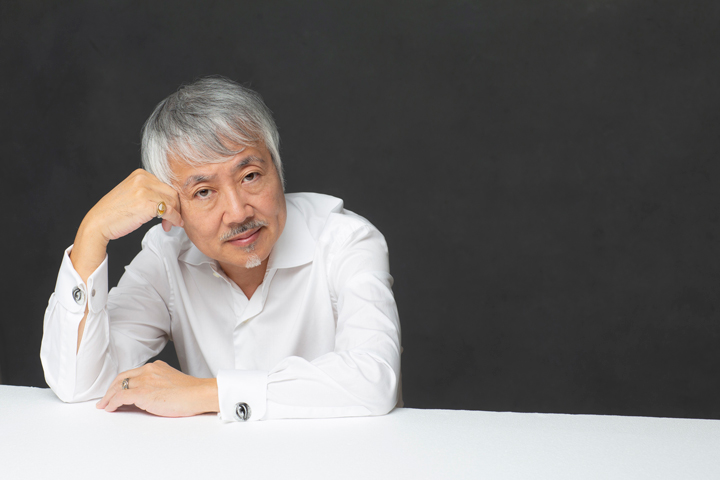CONTACT
YASUAKI SHIMIZU
あっりがっとね〜っ
Si, Gra-zi-e!
イタリアのとても小さな温泉町の駅。暮れ始めて、すこし寂しい感じのするローカルな駅のプラットホームには、二十人あまりの町のひとたちが列車を待っていた。数少ない二等車両の降車場所にかたまる、隣町へ買物にでかける藤籠をさげた子供連れのふとった女、仕事から帰る労働者たち、学生、さっそく微酔いかげんになったお腹のつきでた中年男。その誰もがとめどなく、会話を続けている。ずっととぎれることなく話し続ける声は、もはや言葉には聞こえず、遠い音のかたまりだった。だしぬけに、アナウンスの声がプラットホームに鳴り響き、そのかたまりを叩き割った。「注意!注意!シシリーからベニスに向かう特急列車が通過します」すると一拍おいて、音のかたまりは、まるでおおきなお世話だと言わんばかりに、「あっりがっとね~っ」と大合喝。なんと絶妙なタイミング。もちろん、誰ひとりとして通過する列車を気にとめもしない。そこにあるのは、遠い音のかたまりだった。
映画や音楽、さまざまな表現について語ることは、今日ますます難しくなってます。たとえば、僕も音楽をつくっていますが、いろいろなひとたちが僕について、誉めたり、批判したり、いなしたり、分析(何を!)します。そこには、バッドな清水や、ナイスな清水、それなりの清水、はたまたガンバッて欲しい清水がいるんです。人違いされることもよくあります。ホント一?って思う清水もたくさんいるわけです。そして、残念ながら、人違いもふくめて語られる、いろんな清水がお互いのバランスをとって調和しているようにみえます。手に手をとりあって、まるで「81/2』の大団円のように丸を描ながら、同じように、清水だけでなく、いろんなフェリーニ、いろんなロータが世の中にいます。
ところでいま、ニーノ・ロー夕はどんなありかたになっているのでしょうか?
「フェリーニとの共同作業を代表とする現代映画音楽作曲家の巨匠として、また、新古典主義の純音楽作曲家として、今日まで大きな影響を音楽界にあたえたニーノ・ロータ」と語られることの多いロータですが、それと同時に音楽や映画の専門的分野以外のところに、一種独特の空間をつくるタネをばらまいたこともロー夕を語るうえで付け加えるべきだと思います。それは彼の音楽活動から、自然と発生したようなものですが、目に見えないかたちでそれが現象になっているように思えます。たとえば音楽や映像をふくめた流行のいくつかのふしめのなかに、無意識にロータが見え隠れしてくるのです。しかも、異なった衣装を着て。これは必ずしも口一夕だけにあてはまることではありませんが、僕にはロータとフェリーニの蜜月の時代に、大地を掘り耕すような最も重要な行為がなされたのではないかと思えます。そしていまでは、いつのまにかそのタネがひとしれず一般に萌芽してひとり歩きし、生活の中に組み込まれているわけです。とくにいまは生活が映像化しているから、表面的な感触は誰もが味わうことができるでしょう。
映画はより多くの人々にうったえかける表現としての機能を持ち、表現を広範にさまざまなレベルで深めることが出来ます。ときには、感覚的な部分において、書物にもまさる表現方法になることもあり、ましてや、フェリーニやロータのような監督、音楽家や俳優たち、専門職の表現者たちがかかわることによって、言葉の機能をこえて、より感覚にうったえる作品がいくつもつくられてきました。
さて、「オーケストラ・リハーサル」は、TV局がオーケストラにインタヴューするという設定ですが、実際はオーケストラを社会にたとえ、ここでもフェリーニのほとんどの作品に一貫した主題を、そのまま観せることをしていません。オーケストラのメンバーひとりひとりの性格、さらに楽器群としての性格などを、イタリア人特有のユーモラスな皮肉をまじえて、つづら折り的構成で話は展開します。指揮者という過去からの絶対的な指導者(権力者)を否定し、楽器群、ついにはメンバーひとりひとりまでも否定して、そして秩序を失い崩壊寸前の状態に陥り、それにおのおのが気づき、また新たな秩序がうまれる。そこでのロータの音楽の手法は「オーケストラ・リハ一サル」つまり、フィクションとしてのドキュメンタリー映画にあらゆる意味で同一化しています。この多面的な同一化のアプローチは、しばしば俳優たちの会話の裏で独自な波をつくり、また会話と戯れながらも、ラスト・シーンではロータの音楽が主役を演じるという、異質な説得力をもつ結果を生みました。最後に俳優たちが、我を忘れてロータの曲の演奏を演じるくだりは、滑稽かつ味わい深いものがあって痛快です。
ロータやフェリ一二をふくめて、イタリア人は冗談がいきがいのような民族だと思います。ひとりひとりが、「あっりがっとね~っ」のひとたちです。そんな日常をかさねていく度に研ぎ澄まされていくひとたち。彼らの生み出すマジックは、いまでもそれが原動力になっていると思います。
Yasuaki Shimizu / translated by Pamela Miki
A railway station in a tiny, Italian hot-spring town. Evening was setting in on the platform of this lonesome local station as twenty-some-odd villagers waited for their train. Huddled where the few second-class carriages would eventually arrive were a woman with a basket on her arm and children at her heels, off to the next town for some shopping; laborers heading home from a long day’s work; students; and a middle-aged man with a protruding gut and an early buzz. All chattered incessantly. The unbroken cacophony, not even remotely distinguishable as words, formed a distant mass of sound. Suddenly a PA announcement echoed across the platform, shattering that mass: “Attention! Attention! Sicily–Venice express passing through,” followed one perfectly measured beat later by a chorus of thanks for this great favor, “Sì, gra-zi-e!” The timing was exquisite! Of course, not a single person stopped their conversation to notice the passing train. There was again the mass of sound.
Commenting on cinema and music and other forms of expression becomes progressively more difficult these days. I, for one, make music, and all sorts of people praise, criticize, dodge, analyze (heaven knows what!), etc. me. There’s a bad Shimizu, a nice Shimizu, an interesting-in-his-own-way Shimizu; then there’s the Shimizu they want to fight to exist as himself. I am also often mistaken for the wrong person. “Really?” you ask? Well, yes. There are a lot of Shimizus out there. And with all these Shimizus—including, unfortunately, the mistaken identities—being talked about, they tend to counterbalance one another and strike a harmony—hand in hand, forming a circle, like the denouement of 8 1/2. This is not a phenomenon unique to Shimizu: there are also various Fellinis, and various Rotas.
How now, by the way, should Nino Rota be known?
He is spoken of most often as “the master contemporary film composer, famous for his collaborative work with Fellini, and for his great and continuing influence on the music world as a neoclassicist, pure-music composer,” but I also think that when one speaks of Rota something should be added about how he sowed the seeds for the creation of a unique kind of space outside the fields of music and cinema. This was something that seemed to occur spontaneously, as an extension of his musical activities, a phenomenon that developed unseen. Rota, for example, unconsciously appears and disappears in any number of trends involving music and film. What’s more, he wears different clothes. This phenomenon goes beyond Rota, of course; for me, some of the most significant, “earth-cultivating” acts took place in the heyday of Rota and Fellini. And having secretly germinated unnoticed in the popular world, surviving autonomously, those seeds are now integral to contemporary living. Especially now, when life is based on image to such a degree that everybody can relate to superficial feeling.
Cinema has expressive capabilities of great depth and breadth which appeal to large numbers of people, on various levels. At times, in the sensual realm, it becomes an expressive method that surpasses print. I doubt there is any need to cite here the number of works that transcend the capabilities of words which were created through the involvement of directors and musicians, like Fellini and Rota, working with actors and others making a career of expression.
Orchestra Rehearsal is set as an interview with a TV station orchestra—a metaphor for society, although, as is consistent with most Fellini films, not an explicit one. The interwoven storylines develop the character of each orchestra member, and moreover their character as an orchestra, with a bit of quintessentially Italian humorous irony mixed in. The conductor, long the absolute leader (authority) is negated; next the orchestra, then the members one by one, until finally, as the system rests on the verge of collapse, there comes individual awareness, from which a new order is born. In every way, Rota’s musical approach is identical to Orchestra Rehearsal, i.e. documentary as fiction. Sometimes making waves of its own behind the actors’ dialogue, sometimes flirting with the dialogue, and in the final scene performing the leading role, that multifaceted sameness of approach creates results of differently persuasive power. The comical yet profound meaning in the final passage, when the actors lose themselves playing Rota’s music, is sublime.
To Italians, Rota and Fellini included, jest is the essence of living. They are “sì, gra-zi-e!” people, each and every one; and they hone their gift living day upon day. The magic they create has until now and will always be their driving force.
